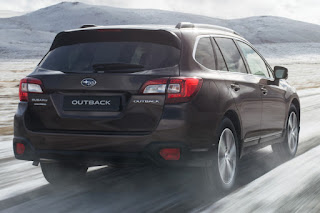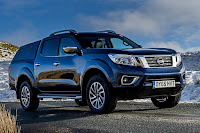2018 Subaru Outback specifications confirmed
While the updates might be hard to spot, the post-facelift Outback can be recognised by its redesigned front end. Inside, the changes are equally as subtle, but gloss black trim pieces, silver surrounds and enlarged touchscreens are the telltale signs.
Equipment upgrades for 2018 focus on safety. In particular, Lane Keep Assist – which automatically applies steering corrections to prevent course deviations – has been added to the EyeSight suite of assistance technologies.
Furthermore, extra exterior-view cameras are now fitted to the front grille and the base of the passenger-side door mirror. For enhanced night-time driving on twisty roads, steering-responsive LED headlights come as standard for the first time.
Prices for the SE version start at £29,995 and the SE Premium alternative costs from £33,010. Additional kit on the latter includes leather upholstery, electric adjustment for both front seats, a sunroof, a powered tailgate and bigger 18” alloy wheels.
Significantly, Subaru is no longer offering a diesel-powered Outback, so the only available engine is a 2.5 litre, naturally-aspirated, four-cylinder petrol unit.
At first glance, 172 bhp (128 kW / 175 PS) and 235 Nm (173 lb/ft) of peak torque seem acceptable enough. However, they don’t translate into decent performance or efficiency, primarily because the rest of the powertrain consists of a Lineartronic continuous variable transmission and permanent all-wheel drive.
Such an unusual amalgamation allows the Outback to accelerate from rest to 62 mph (100 km/h) in 10.2 seconds, before going on to a top speed of 123 mph (198 km/h). 38.7 mpg (7.3 l/100km) with CO2 emissions of 166 g/km on the combined cycle are the figures that will deter many prospective customers, though.
Related posts:
Sayonara to the Subaru WRX STI
2018 Subaru Impreza European launch date
Equipment upgrades for 2018 focus on safety. In particular, Lane Keep Assist – which automatically applies steering corrections to prevent course deviations – has been added to the EyeSight suite of assistance technologies.
Furthermore, extra exterior-view cameras are now fitted to the front grille and the base of the passenger-side door mirror. For enhanced night-time driving on twisty roads, steering-responsive LED headlights come as standard for the first time.
Prices for the SE version start at £29,995 and the SE Premium alternative costs from £33,010. Additional kit on the latter includes leather upholstery, electric adjustment for both front seats, a sunroof, a powered tailgate and bigger 18” alloy wheels.
Significantly, Subaru is no longer offering a diesel-powered Outback, so the only available engine is a 2.5 litre, naturally-aspirated, four-cylinder petrol unit.
At first glance, 172 bhp (128 kW / 175 PS) and 235 Nm (173 lb/ft) of peak torque seem acceptable enough. However, they don’t translate into decent performance or efficiency, primarily because the rest of the powertrain consists of a Lineartronic continuous variable transmission and permanent all-wheel drive.
Such an unusual amalgamation allows the Outback to accelerate from rest to 62 mph (100 km/h) in 10.2 seconds, before going on to a top speed of 123 mph (198 km/h). 38.7 mpg (7.3 l/100km) with CO2 emissions of 166 g/km on the combined cycle are the figures that will deter many prospective customers, though.
Related posts:
Sayonara to the Subaru WRX STI
2018 Subaru Impreza European launch date



+Front+Side.jpg)


%2BFront%2BSide.jpg)



Comments
Post a Comment